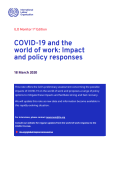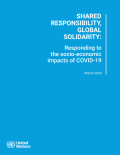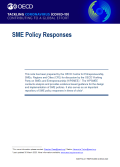
COVID-19 will have far-reaching impacts on labour market outcomes. Beyond the urgent concerns about the health of workers and their families, the virus and the subsequent economic shocks will impact the world of work across three key dimensions: 1) The quantity of jobs (both unemployment and underemployment); 2) The quality of work (e.g. wages and access to social protection); and 3) Effects on specific groups who are more vulnerable to adverse labour market outcomes.
In times of crisis, International Labour Standards provide a strong foundation for key policy responses that focus on the crucial role of decent work in achieving a sustained and equitable recovery. These standards, adopted by representatives of governments, workers’ and employers’ organizations, provide a human-centred approach to growth and development, including by triggering policy levers that both stimulate demand and protect workers and enterprises.
In this policy note, the ILO provides a policy framework for addressing COVID19 with three pillars:
Protecting workers in the workplace


The OECD is compiling data, analysis and recommendations on a range of topics to address the emerging health, economic and societal crisis, facilitate co-ordination, and contribute to the necessary global action when confronting the enormous collective challenge of COVID19. A new series of policy response documents span topics from health to education and taxes, providing guidance on the short-term measures needed in affected sectors and a specific focus on the vulnerable sectors of society and the economy. Beyond immediate responses, the content aims to provide analysis on the longer-term consequences and impacts, paving the way to recovery with co-ordinated policy responses across countries.
